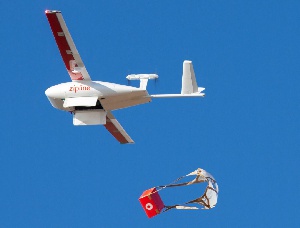The narrative has it that Rwanda’s President Paul Kagame met a friend of his who wanted to use drones in offering services to people; he expressed interest and directed the drone company, Zipline, to the Ministry of Health. That was when the conversation started. It moved through all the preparatory discussions until it become a reality in October 2016.
This led to the birth of the company in that country when Zipline International Inc. – backed by Silicon Valley heavyweights including Sequoia Capital, and headquartered in California – decided to open its first distribution centre in Muhanga, west of Rwanda’s capital, Kigali.
Today, losing a life in Rwanda because a health facility could not provide a patient with blood for surgery is a thing of the past.
During a visit to the Ruhango Provincial Hospital in the Southern Province by a group of Ghanaian media practitioners last week, to learn at first hand Ziplines’ operations in that country, the hospital needed blood to operate on Benjamin Demetrious (not his real name) and within 25mintes the hospital received the blood after it had made the request to the Zipline drone point, which is an hour and half drive to the hospital through an untarred road.
Mountainous Rwanda has 3,000 miles of road but only 25% of that is tarred, and much of it is washed away during rainy seasons. This makes transportation tough, and hospitals struggle to procure blood and vaccines in emergency situations.
Before the advent of Zipline in that country, trucks were used to deliver blood to the hospitals, or to take it into regional health centres across the country for distribution to hospitals.
But now, from the Muhanga drone point, it takes only 25 minutes; and so, one can be operating in the theatre and just make a quick order to the centre, and blood will be delivered in a short time.
Rwandans can now see the difference in terms of time and lives that have been saved, Dr Richard Usabyineza, Director-General of the hospital said.
“We have become very efficient,” said the head of the US$9million 360-bed capacity hospital.
“We save a lot of money on vehicle maintenance, fuel and other costs because we do not rely on the vehicles anymore. The transformation is huge, and we are reducing maternal mortality in the country too,” he said.
Remote clinics are now in a position to place orders for life-saving blood via text message, with drones dispatched from fulfillment centres. Since its launch, Zipline drones have on their own clocked up thousands of miles through more than 10,000 flights, delivering thousands of units of blood.
At the Zipline distribution centre, there are two main jobs: fulfillment operators, who package the requested blood; and flight operators who launch the drones. As soon as the order is packaged – which is done within two minutes at the time of the order, it is given to the operators who assemble the plane, pack the bags of blood inside and place them onto a launcher, which catapults drones into the air. The mini-aeroplane drone is programmed to deliver the package accurately through information that has been fed into its memory.
The drones fly at a speed of 150 kilometres per hour.
When the aircraft returns, a robotically-controlled line catches the plane by its tail, after which two people disassemble the plane that is not humanly controlled. Unlike fears raised earlier, the drones have no cameras – an observation the experts confirmed, saying “this is purely meant to deliver medicines and blood, and not to even take aerial shots”.
Ghana operations
Operators of Fly Zipline Ghana are optimistic that it will launch operations by the second quarter of the year. Believed to be the biggest in Africa, it is expected to deliver blood and other essential medicines to health facilities within the country.
Presently, construction work on a base for the flights is underway at Dominako, five kilometres from Suhum in the Eastern Region.
The project, the first of four to be constructed in the country, will serve areas within the Eastern Region as well as the Afram Plains, Volta Region, and parts of the Greater Accra and Ashanti Regions.
To ensure that Ziplines’ operations in Ghana take off smoothly, a number of Ghanaian experts are undergoing months of training at the centre.
Experts believe Ziplines’ operations will help transform the country’s health delivery system.
Parliament last year December approved the deal for drones to be used in medical delivery after three failed attempts.
Government says the deal will see critical medical supplies reaching disconnected areas and improve the nation’s overall medical supply chain.
Opinions of Wednesday, 13 February 2019
Columnist: thebftonline.com















